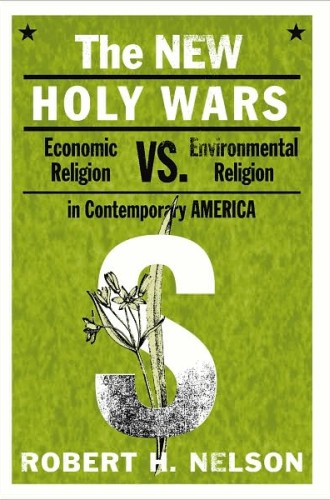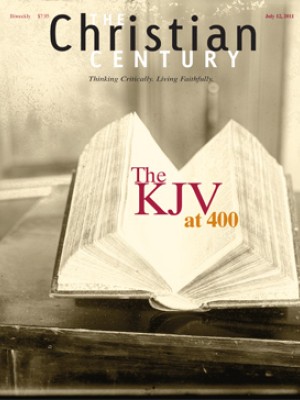The New Holy Wars, by Robert H. Nelson
I have only a small flickering light to guide me in the darkness of a thick forest. Up comes a theologian and blows it out." So complained 18th-century French philosopher Denis Diderot. It is true that much that passes for theology fails to illumine the path, and it does not help to claim that nontheological reasoning is often equally opaque. Thankfully, a few lights shine brightly.
In the 1990s political scientist Glenn Tinder had the audacity to write Can We Be Good Without God?—a book that was more frontally theological, more able to connect God and politics, than the offerings of many theologians. Several other nontheologians—literary theorist Harold Bloom and legal scholar John Witte Jr., for example—have a way of entering deep into the theological woods and shining light in the darkness.
Read our latest issue or browse back issues.
University of Maryland economist Robert Nelson has earned a place in this group. In The New Holy Wars this nontheologian proves capable of out-theologizing many theologians. Nelson's earlier volumes and articles (some of which are collected in this volume, making it repetitive at times) position him as one who pays sustained attention to key questions being ignored by many others. Apart from proponents of the prosperity gospel and liberation theology, how many theorists meaningfully connect theology and economics? How many believers credibly use the term God in relation to the social, political and economic—and not merely personal—dimensions of their lives?
Nelson convincingly argues that economics and environmentalism are two new secular religions that require theological understanding. The novelty of Nelson's approach is not so much that he calls these approaches secular religions, but that he analyzes their conflicting values and articulates their internal inconsistencies. Economics assumes that growth is always good; that development is necessary, progressive and universally coveted; and that noneconomic costs can be ignored in calculations of utility. Environmentalism assumes that nature is itself of fundamental value and should not be despoiled; that development is likely to rape and plunder holy ground thoughtlessly; and that human nature, though itself an evolutionary product, is a corruption within nature's sacred corpus.
In most respects, one needs to side with either the economists or the environmentalists, but Nelson's subtle treatment reveals points of intersection. Both, for example, advocate particular values. Economists are fundamentally committed to the proposition that consumption is the true source of happiness. The environmentalists want to reserve large tracts of wilderness as repositories of land untouched by human hands. The theological connection noted by Nelson is that economists and environmentalists both identify a vaguely divine realm. The mainstream economist tradition allows Thomas Hobbes's mortal god to guide the invisible hand of Adam Smith's market; environmentalists reserve a space that humans cannot breach, thus ensuring the existence of a hidden realm, a sanctuary for discovering the divine.
Nelson's work seeks to further the "libertarian and dissenting side of the Protestant tradition," especially as manifested in the work of Frank Knight and the Chicago school of economics. This tradition's secular saints see through the traps of the progressive economic and social gospel and the ever-widening role of government and its cadre of scientific specialists. They instead see the power and interests of the individual as foundational. Nelson avers that their type of thinking can join with and lend theological coherence to environmental religion as it turns from the progressive aspects of economic religion.
Given Nelson's analysis, we should ask whether security is another secular religion. Might security be a secularization of the doctrine of providence—a claim that political power can reduce our security risks to zero? Are Big Brother's eyes on the sparrow, or does that idea have too much environmental resonance? The security god also is the end-times judge, who destroys those who wander from the designated path. In the religion of security, we also find incongruities of the kind noted in Nelson's analysis: liberties are suspended to protect liberty; Shari'a-based states are militarily overthrown, ostensibly to promote democracy; and so on.
Nelson defines economics and environmentalism as secular religions because they offer "comprehensive worldviews and myths that provide humans beings with the deepest sense of meaning." Insofar as that is true, Christian pastors and theologians have their work cut out for them. One strategy might be to follow Nelson's analysis, then offer a theological rejoinder. For example, Nelson notes that the secularization of theology can be dangerous, as when misanthropic forms of environmentalism see humans as pure menace, a logic that suggests that it may be desirable for humans to be eliminated from the earth. A task of theology and ministry would be to identify such destructive tendencies that are latent within various currents of secular theology and to offer a reasoned theological response.
Another strategy might be to see economics and environmentalism as new forms of idolatry or heresy and to develop coherent theological alternatives. Yet another might be to question Nelson's libertarian-environmental account theologically and to reform the progressive heritage. Many of the chapters of this volume were written before the massive economic collapse of
the Great Recession, a catastrophe that opens up ground for a theologically astute Keynesianism that sees a role for the cooperative salvation of larger structures.
To engage the issues Nelson raises, theologians and pastors will need to devote more time to reading sociology, economics and theology and less to studying psychology and spirituality. That might be thought of as the opportunity cost of doing God's business in the early 21st century.






